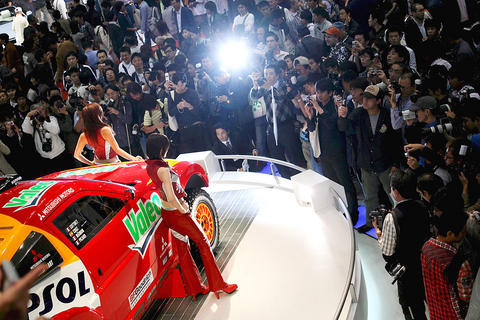Japanese automakers were aiming for maximum publicity as the covers came off their sleek new cars at the Tokyo Motor Show last week, accompanied by popping champagne corks and glamorous models.
But some cars were drawing slightly too much attention for automakers' comfort as the more serious business of spying on rivals' vehicles got underway discreetly, along with efforts to protect products from enemy eyes.
Many foreign automakers and parts suppliers are eager to get every detail of the industry leaders' new vehicles, which they hope to use for their own products, motor industry watchers said.

PHOTO: EPA
Although no Chinese automakers and parts suppliers had stands at the motor show, many were believed to have sent people to the event to take notes and pictures of the latest designs, along with others from elsewhere in Asia, they said.
"It's a common practice," Credit Suisse Securities auto analyst Koji Endo said.
"Japanese automakers are also doing that in Frankfurt or in America," he said.
The show also provides the chance to get close to recently launched models.
In one Toyota car sold only in the Japanese market that was on display at the Tokyo Motor Show, two men were seen occupying the front seats and taking numerous close-up pictures of the dashboard and interior.
Elsewhere, a man was spotted taking close-up photos of every part of another model, from the front of the car to the bottom edge of a door, before squatting down on the floor to snap shots of the car's belly.
At the Nissan stand, a trio of men were scrutinizing switches around the steering wheel of a luxury sedan that made its Japan premiere.
"Everybody knows spy operations are going on," said a veteran motor journalist who has been following the industry for more than a dozen years.
Carmakers buy rivals' products to dissemble, but many are still eager to look at the underside of the vehicles on display, he said.
"The layout of suspension, pipes and other `entrails' gives you important information. You can tell if a concept car is just a paper tiger or close to reality by examining its belly," he said.
Some manufacturers have strategies to keep the "spies" away.
"Automakers have their `staff for product explanation' right next to vehicles that they want to protect and make sure they keep an eye out all the time," the journalist said, on condition of anonymity.
Important vehicles are displayed at the most conspicuous but hard-to-touch places, often on glitzy stages or elevated areas.
"It's the same at normal stores. Easy-to-steal gums and candies are near the cashier," he said.

MORE VISITORS: The Tourism Administration said that it is seeing positive prospects in its efforts to expand the tourism market in North America and Europe Taiwan has been ranked as the cheapest place in the world to travel to this year, based on a list recommended by NerdWallet. The San Francisco-based personal finance company said that Taiwan topped the list of 16 nations it chose for budget travelers because US tourists do not need visas and travelers can easily have a good meal for less than US$10. A bus ride in Taipei costs just under US$0.50, while subway rides start at US$0.60, the firm said, adding that public transportation in Taiwan is easy to navigate. The firm also called Taiwan a “food lover’s paradise,” citing inexpensive breakfast stalls

TRADE: A mandatory declaration of origin for manufactured goods bound for the US is to take effect on May 7 to block China from exploiting Taiwan’s trade channels All products manufactured in Taiwan and exported to the US must include a signed declaration of origin starting on May 7, the Bureau of Foreign Trade announced yesterday. US President Donald Trump on April 2 imposed a 32 percent tariff on imports from Taiwan, but one week later announced a 90-day pause on its implementation. However, a universal 10 percent tariff was immediately applied to most imports from around the world. On April 12, the Trump administration further exempted computers, smartphones and semiconductors from the new tariffs. In response, President William Lai’s (賴清德) administration has introduced a series of countermeasures to support affected

CROSS-STRAIT: The vast majority of Taiwanese support maintaining the ‘status quo,’ while concern is rising about Beijing’s influence operations More than eight out of 10 Taiwanese reject Beijing’s “one country, two systems” framework for cross-strait relations, according to a survey released by the Mainland Affairs Council (MAC) on Thursday. The MAC’s latest quarterly survey found that 84.4 percent of respondents opposed Beijing’s “one country, two systems” formula for handling cross-strait relations — a figure consistent with past polling. Over the past three years, opposition to the framework has remained high, ranging from a low of 83.6 percent in April 2023 to a peak of 89.6 percent in April last year. In the most recent poll, 82.5 percent also rejected China’s

PLUGGING HOLES: The amendments would bring the legislation in line with systems found in other countries such as Japan and the US, Legislator Chen Kuan-ting said Democratic Progressive Party (DPP) Legislator Chen Kuan-ting (陳冠廷) has proposed amending national security legislation amid a spate of espionage cases. Potential gaps in security vetting procedures for personnel with access to sensitive information prompted him to propose the amendments, which would introduce changes to Article 14 of the Classified National Security Information Protection Act (國家機密保護法), Chen said yesterday. The proposal, which aims to enhance interagency vetting procedures and reduce the risk of classified information leaks, would establish a comprehensive security clearance system in Taiwan, he said. The amendment would require character and loyalty checks for civil servants and intelligence personnel prior to